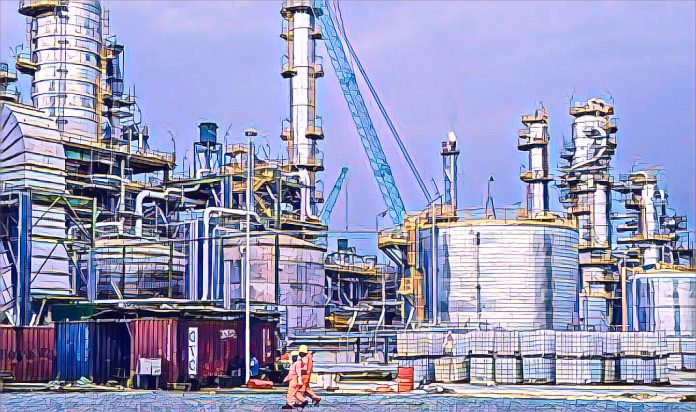To stabilize fuel prices and strengthen the naira, the Federal Government of Nigeria has finalized an agreement with Dangote Petroleum Refinery for the rollout of Premium Motor Spirit (PMS), commonly known as petrol, starting in September. This agreement is part of a broader initiative led by a committee established by President Bola Tinubu to transition the sale of crude oil to local refineries from foreign currency transactions to naira payments. The government has also set October 1, 2024, as the start date for the sale of crude oil to Dangote Refinery and other local refineries in naira.
The Minister of Finance and Coordinating Minister of the Economy, Wale Edun, disclosed this during a meeting with the implementation committee in Abuja. The meeting aimed to review progress on key initiatives, particularly the upcoming transition to naira-based crude oil sales. According to a statement from the finance ministry, the committee outlined crucial roles for stakeholders, including the Nigerian Midstream and Downstream Petroleum Regulatory Authority (NMDPRA), the Central Bank of Nigeria (CBN), the Nigerian Upstream Petroleum Regulatory Commission (NUPRC), and the African Export-Import Bank, to ensure the smooth implementation of the new policy.
During the meeting, the Executive Chairman of the Federal Inland Revenue Service, Dr. Zacch Adedeji, who also chairs the Technical Sub-Committee, confirmed that the first PMS delivery from Dangote Refinery is expected next month under existing agreements. Updates were also provided on the progress of the Port Harcourt Refinery and the Dangote Refinery, with significant increases in production expected by November 2024.
Minister Edun emphasized the importance of transparency throughout the implementation process. He directed the Technical Sub-Committee to finalize the details and prepare a comprehensive report for President Tinubu, ensuring that the President’s directives are on track for implementation from September.
This agreement marks a pivotal moment in Nigeria’s energy sector. In July, the Federal Executive Council approved President Tinubu’s proposal to stop selling crude oil to local refineries in foreign currency. Instead, the 450,000 barrels of crude oil allocated for domestic consumption will now be sold in naira to Nigerian refineries, with Dangote Refinery serving as the pilot for this initiative. The policy shift aims to stabilize the pump price of refined fuel and manage the dollar-naira exchange rate, which has been a persistent challenge for the country.
The Dangote Refinery, with its capacity of 650,000 barrels per day, requires 15 cargoes of crude oil annually. This large-scale operation is expected to significantly impact Nigeria’s fuel market, potentially reducing the cost of petrol and easing pressure on the naira. The finance ministry’s recent meeting was the second held within a week, indicating the urgency and importance of this transition.
However, challenges remain. Local refineries, represented by the Crude Oil Refiners Association of Nigeria (CORAN), have expressed concerns that they have yet to begin purchasing crude oil in naira. CORAN’s Publicity Secretary, Eche Idoko, revealed that letters have been written to the Nigerian National Petroleum Company (NNPC) to address these concerns. CORAN is pushing for crude supply contracts with refineries that are already operational and conditional supply contracts with those in the Authority To Construct (ATC) and construction stages. These contracts are essential for finalizing investment decisions and bringing refineries to full operational capacity.
Idoko has consistently advocated for the supply of crude oil to local refineries in naira, arguing that it would lower petrol prices and strengthen the naira against the dollar. He commended President Tinubu for considering the needs of indigenous refiners but urged that an executive order be issued to solidify the new directive.
Despite these positive steps, Dangote Refinery and other domestic refiners have faced ongoing difficulties in securing crude oil for their operations. The management of Dangote Group has repeatedly voiced frustration over the obstacles posed by international oil companies (IOCs). According to Dangote, these companies prefer selling crude oil through their foreign agents, which has driven up the local price of crude. The group claims that trading arms are offering cargoes at $2 to $4 per barrel above the NUPRC’s official price, further complicating the refinery’s access to affordable crude oil.
The Dangote Refinery’s management has also alleged that foreign oil producers prioritize selling Nigerian crude to Asian countries, leaving domestic refineries at a disadvantage. This situation has led to tensions between Dangote Refinery and NUPRC, with both parties exchanging accusations over the alleged supply of 29 million barrels of crude oil to the refinery.
In the midst of these challenges, the Arewa Consultative Forum (ACF) has expressed strong support for Dangote Petroleum Refinery. In a statement issued in Kaduna by its National Publicity Secretary, Prof. Tukur Muhammad-Baba, the ACF criticized the negative debates and controversies surrounding the refinery. The forum described the Dangote Refinery as a source of national pride and praised Aliko Dangote, the visionary entrepreneur behind the project, for his courage and patriotism. The ACF delegation that visited the refinery on July 30, 2024, was impressed by its sophisticated quality testing and control laboratories, which meet and exceed global industry standards.



